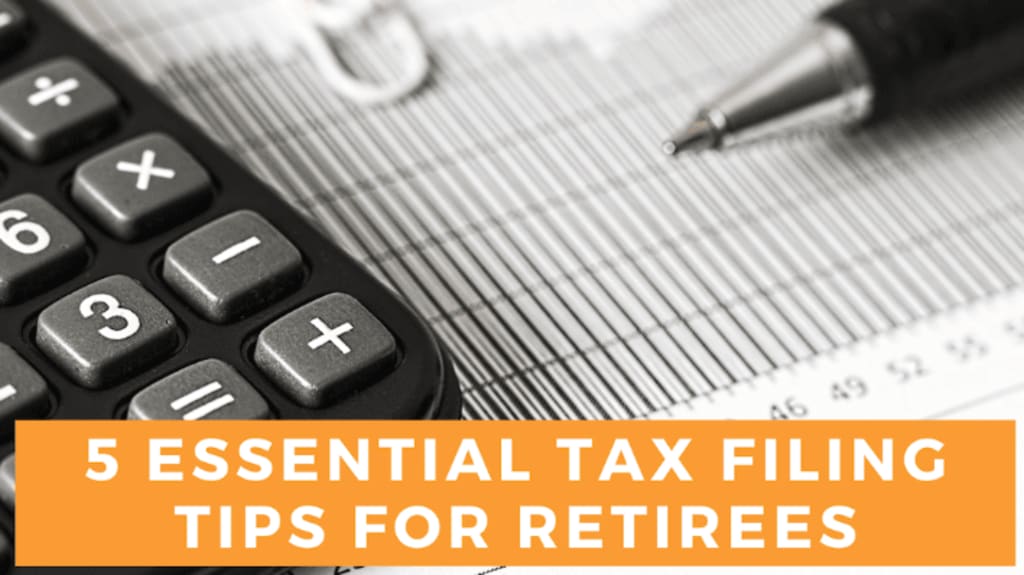5 Essential Tax Filing Tips for Retirees
5 Essential Tax Tips for Retirees [Loopholes & More!]

If there’s one thing that every American can agree on, it’s that no one enjoys paying taxes. No matter where you live or how much money you earn, giving the IRS a chunk of your income is downright infuriating. Yet there’s no way to avoid it.
There are, however, lots of ways to reduce your tax liability. And for retirees who are no longer working, that’s even more important.
Ready to learn how to maximize your deductions and reduce your tax debt? Here are five essential tax filing tips for retirees.
1. Have Taxes Withheld When You Take Your RMDs
Investing in an IRA is a great way to save money (tax-deferred) for retirement. But when you hit 70 ½ years old, federal law dictates that you have to start taking money out of your retirement account.
Why? Because IRA distributions are considered income, and Uncle Sam wants the taxes you never paid on that money.
The amount you need to withdraw is called your Required Minimum Distribution, or RMD. If you don’t take your RMD, you’ll pay for it at tax time.
When you withdraw them, ask your fund manager or bank to withhold the taxes upfront. Otherwise, you’ll end up having to pay taxes at the end of the year.
The exact amount of your RMD decreases every year as you age. The amounts are calculated based upon your age and your life expectancy, as determined by the IRS. The younger you are, the more you’re required to withdraw each year.
(Click here for the 2020 rates and percentages).
If you don’t withdraw the minimum amount required, you’ll pay a penalty. The penalty is equal to 50% of the difference between the amount you took and the amount you were supposed to take.
You can also elect to have taxes withheld from your Social Security payments. If you don’t, you’ll have to pay taxes on that “income” as well.
2. Track Your Medical Expenses
Keep a log of all your medical expenses, including insurance premiums, out-of-pocket expenses, and medication costs. If your out-of-pocket medical expenses exceed 10% of your AGI, you can deduct the excess.
However, in order to write off your expenses, you’ll need to itemize your deductions — you can’t just take the standard deduction.
If the standard deduction is more than your itemized deductions, your medical expenses won’t matter. But if your itemized deductions exceed the standard, even by a few dollars, it’s worth it to itemize.
Your medical expenses might be what puts you over the threshold for itemizing. But whether you itemize or not, it's always smart to keep receipts and track your medical expenses throughout the year.
3. Reduce Your Taxes Through Securities Gifts
Thinking about making some charitable contributions? That’s a great way to reduce your tax burden. But donating cash that you’ve already paid taxes on isn’t the best way to do it.
Instead of making cash gifts, donate securities instead.
By donating earnings on securities, you can deduct the entire amount of your appreciated assets. That will cost you less than cashing out those earnings, paying taxes on them, and then donating them.
For example, let’s say you invested $100,000 and now have $150,000 in an account. If you sell and withdraw the $50,000 you’ve earned, you’ll have to pay taxes on it. But if you donate the $50,000 in securities rather than cash, you won’t.
4. Continue to Make IRA Contributions
Federal law allows individuals to make IRA contributions until the age of 70 ½ (the age at which you must start taking withdrawals). If you’re a retiree with a part-time job or side hustle, you can continue to contribute up to $7,000 per year.
This is a smart move if one spouse is fully retired and the other is still working. You don’t have to pay taxes on contributions until you start making withdrawals. The money you stash away is tax-deferred until withdrawals are made.
If you’re older than 70 ½, you might want to contribute to a Roth IRA.
There is no age limit on Roth IRA contributions — you can add funds indefinitely. You will pay taxes on Roth contributions upfront, but you won’t have to pay taxes when you withdraw your earnings.
5. Hire a Professional
Online tax filing programs may be inexpensive and easy to use, but they don’t provide advice. The best way to reduce your tax burden (for this year and future years) is to hire a professional.
A professional tax preparer can provide insight into things you can do NOW to reduce your tax bill for next year. They're also good at coming up with creative (but still legal) ways to keep as much money in your pocket as possible.
Hiring a professional is especially important if you’re a new retiree, if you just sold a home, or if you recently started tapping into a pension plan. They can also help you navigate the waters regarding Social Security earnings and payouts.
Depending on how complicated your taxes are, a professional can cost several hundred dollars. But they can also save you thousands.
In Summary
We’ve said it before and we’ll say it again:
No one likes paying taxes. But this unavoidable part of life will always exist, so you may as well learn the tricks:
Take your RMDs and have taxes withheld from every payout.
Track your medical expenses in case you decide to itemize your deductions.
Make charitable contributions in the form of securities gifts, not cash gifts.
Make IRA contributions if you can.
Hire a professional to complete your returns and file your taxes for you.
As a retiree who’s no longer earning income, you should do everything possible to keep the money you have for as long as you possibly can.
Author Bio:
Leon Grundstein has more than 28 years of experience in real estate development, with over two decades of experience in the retirement industry. He founded Lynnwood Scriber Gardens with a game-changing business model to promote a healthy and robust retirement lifestyle for older adults.





Comments
There are no comments for this story
Be the first to respond and start the conversation.